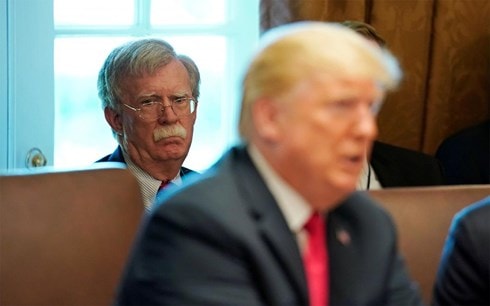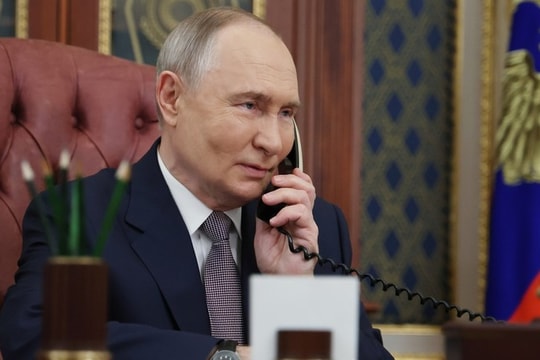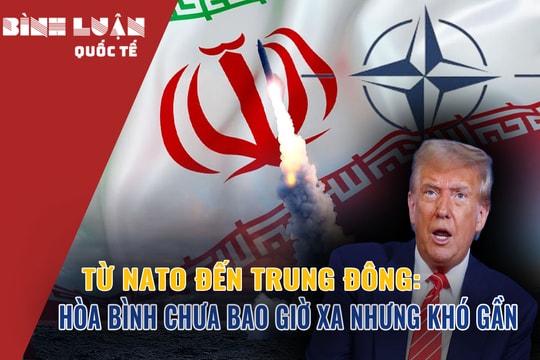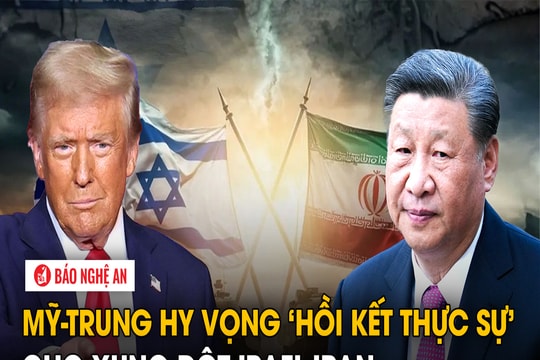US: New campaign targeting China
US President Donald Trump's accusations of Chinese interference in the upcoming midterm elections are a new escalation in tensions between the two countries.
Senior US officials said on September 27 that President Donald Trump's accusations of Chinese interference in the US midterm elections in November marked a new phase in the campaign of increasing pressure on Beijing that Washington is pursuing on many fronts.
|
| US National Security Adviser John Bolton (below) is playing a key role in persuading Mr Trump to take a tougher approach to China. (Illustration photo: Reuters) |
“Total War”
US national security adviser John Bolton, long seen as a hawk on China, is playing a key role in persuading Mr Trump to take a tougher approach to Beijing. Reuters quoted two senior US officials as saying that the approach goes beyond the bitter trade war between the world's two largest economies and will include other disputes such as cyber activities, Taiwan (China) andEast Sea
The strategy is still in its early stages, but the US is expected to take policy actions against China in the coming weeks, although details are not yet known.
The White House did not respond to Reuters' request for clarification on those views.
Earlier, Mr. Trump told the United Nations on September 26 that China was trying to sway the US congressional elections on November 6 against the Republican Party to “punish” him for the trade war. The accusation was made at a time of extreme tension in relations between Washington and Beijing. However, the head of the US did not provide any evidence.
This raises the question of whether Mr. Trump is trying to distract from the investigation into whether his 2016 campaign colluded with Russia, while also setting a “trap” with China in case the Republican Party does poorly in the midterm elections. The November elections will determine whether the Republican Party can still control both houses of the US Congress.
However, senior US officials assert that there is a growing sense within the White House that Mr. Trump needs to issue a high-level warning that China is another powerful rival, alongside Russia, that is waging “hybrid warfare” (including many wars on political fronts, cyberspace…) against US interests.
Among the recent developments in the conflict was Washington's sanctioning of a Chinese military agency and its director for purchasing fighter jets and missile systems from Russia, in violation of US sanctions on Russia. Beijing then summoned the US ambassador to criticize and postpone military dialogue between the two countries.
Increasing pressure on all fronts
The Trump administration is looking to attack China more aggressively on several fronts, including so-called “political influence operations,” an issue about which Mr. Trump has been briefed extensively by U.S. intelligence officials.
“We are at a point where we can start to take action with increased pressure measures across the board, particularly on trade,” a senior US official told Reuters.
Washington has long identified China as the primary culprit in cyberattacks on U.S. government and corporate data. But U.S. officials and analysts say they have yet to detect the kind of systematic political campaign, including social media manipulation, that Russia is believed to have carried out during the 2016 U.S. election.
China also vehemently denied “baseless” allegations that it sought to interfere in the US election.
The only specific action from China that Mr. Trump cited in his September 26 accusation was Beijing’s “placement of propaganda ads” in American newspapers, referring to Chinese state media promoting the mutual benefits of US-China trade that spread across four pages of the Sunday Des Moines Register, a daily newspaper in Des Moines, Iowa.
Iowa is a state that voted for Mr. Trump in the 2016 election, but farmers here are facing serious losses due to the trade war between the US and China.
However, it is quite common for foreign governments to buy advertising space in American newspapers to promote their trade and is completely different from the secret campaign of an intelligence agency.
“The Chinese government has used every means at its disposal to try to get us to reverse course,” a National Security Council spokesperson said when asked to comment. “They are targeting farmers and workers in states and counties that voted for Trump with tariffs and retaliation. They are using other political, economic, trade, military, and media tools to benefit the Chinese Communist Party.”
The Trump administration appears determined to press China more deeply and broadly, even at the risk of a harsh response from Beijing. For example, U.S. officials said Washington is considering tougher measures against Chinese cyber espionage and theft, but they did not provide further details.
Earlier this week, the US military also demonstrated that Washington is ready to continue challenging China's illegal sovereignty claims in the East Sea when it sent B-52 bombers to fly over the area.
Also last week, Beijing was angered when the US approved the sale of spare parts for F-16 fighters and other military aircraft worth up to $330 million to Taiwan (China).
At the same time, officials in Washington are increasingly concerned that China may no longer be fully complying with some international sanctions against North Korea, so they believe the US needs to continue to increase pressure on this issue.
But some analysts suspect that wisdom may have gone too far.
“Frictions and leverage can be effective tools in international relations if they are used wisely, particularly in response to problematic behavior like China’s,” said Daniel Russel, former US Assistant Secretary of State for East Asia and the Pacific and now an expert at the Asia Society Policy Institute (ASPI). “However, an aggressive, frontal attack across the board is unlikely to succeed, especially against a country as large and powerful as China.”









